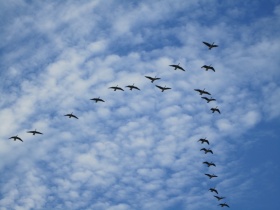We are seeing evidence of zugunruhe at Crossroads. This seasonal restlessness is very evident in Canada Geese, other water birds but also, increasingly, in humans.
Zugunruhe (to state the obvious) is a German word which describes pre-migratory behavior, usually in birds.When the days get short (and they have) ducks and geese are instinctively programmed to migrate. So geese and some ducks respond by eating more, making more noise, and exercising their flight muscles.
If it seems to you that the geese are flying around in circles every day, it’s probably because they are. They are training for their marathon. Flying is strenuous exercise requiring very high rates of aerobic energy with prolonged periods of muscle stress and extreme oxygen consumption.
Geese need to exercise and build stamina for the amazing athletic feat of migration. And so, every day, they are working out—flying around in circles. They probably don’t know that they are in training. It’s zugunfuhe! It happens this time every year.
And every fall, because geese need to build up fat reserves, they don’t just eat; they feed voraciously. They don’t honk now and then. They vocalize frantically almost non-stop, and they are restless all day and well into the night.
As for Canada Geese, some years they do migrate and some winters, they just hang around Door County. Last winter, they left, which was a very good decision. You see, during the cold season, geese eat the roots and tubers of underwater plants (and grain from agricultural fields.) So far, those have been plentiful and available. But soon as the our water freezes over and snowy weather descends on us in earnest, (and probably just a bit before–they somehow) know geese will fly south.
Zugunrube is exhibited by most migrating birds. Even caged wild birds get very restless and even hop or fly in the direction in which they ought to be migrating when the hours of daylight are reduced and the hours of night increased.
Some humans, called “snowbirds for a reason,” do migrate in late fall. But many full-time residents and dogs get very restless, especially if they are virtually caged in their homes during hunting season. Call it cabin fever or the forebidden fruit syndrome, but when you can’t go outside, you really really want to do just that.
But you really really can hike at Crossroads at Big Creek. Because our preserve are within the city limits, hunting is not permitted. Hikers and pets (on a leash and under control) are more than welcome during hunting season and any other time. One possible issue: Should we receive enough snow that we can groom our ski trails, hikers will be restricted to designated hiking trails. Several naturalist-led hikes will be offered this week.
On Saturday, November 22, the Door Peninsula Astronomical Society will hold their November Viewing Night at the very civilized hour of 6:30 pm. Even at that early hour, the sky will be more than dark enough to see stars and planets—if it is clear. Check www.crossroadsatbigcreek.org for the cancelation notice, or just look up. If the sky is overcast, the gate will be closed.


